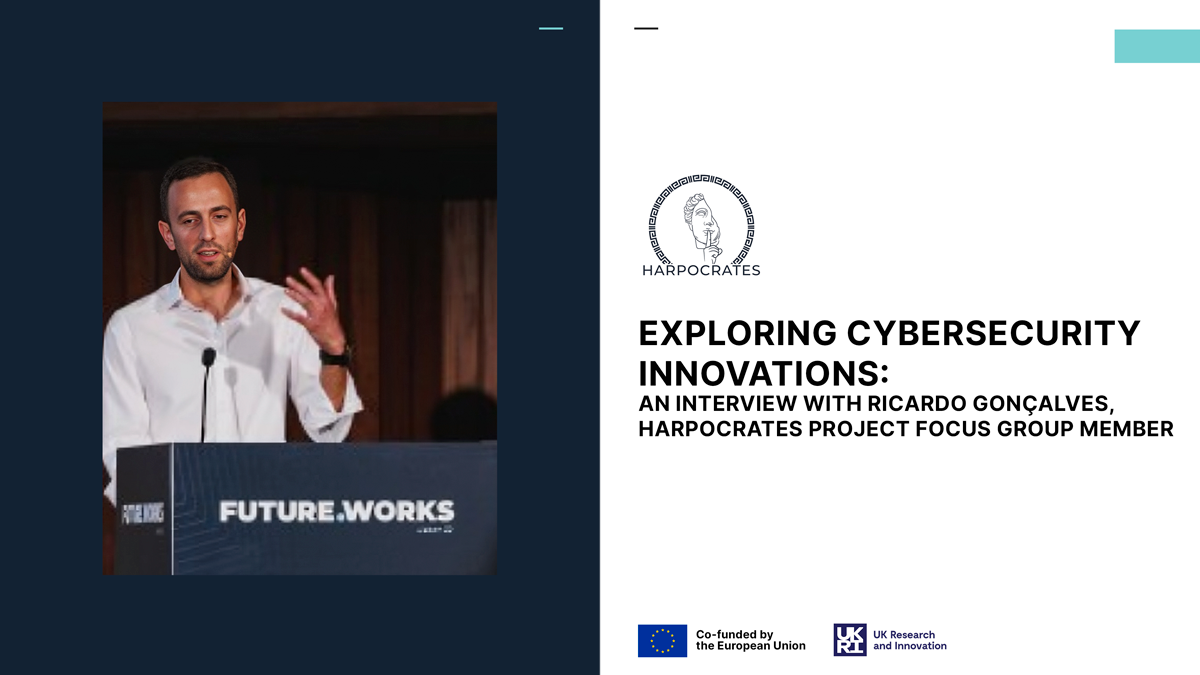Exploring Cybersecurity Innovations: An Interview with Ricardo Gonçalves, Harpocrates Project Focus Group Member
7.5.2024 11:31

Welcome to our discussion on the Harpocrates Project. We are joined by Ricardo Gonçalves, a dedicated local government administrator from Fundão. Ricardo has been deeply involved in leveraging innovation and collaboration to drive local development. He is part of our focus group and brings valuable insights into how the Harpocrates Project can address the unique challenges faced by local governments in areas like cybersecurity and IT.
Short introduction.
My name is Ricardo Gonçalves. Over the past years, I’ve been deeply involved in local and territorial development, using innovation and collaboration as tools to drive socioeconomic growth in my hometown Fundão.
How do you anticipate the Harpocrates project will address specific challenges or issues that you encounter in your daily work as a local government administrator?
As someone deeply involved in smart city initiatives, I see Harpocrates as a critical tool for overcoming resource and expertise limitations in IT and cybersecurity that many local governments face. This project not only equips us with necessary tools and insights to tackle complex cybersecurity challenges but also emphasizes federated data sharing and analysis to enhance public service management in a secure and efficient manner. This will boost our capacity to protect sensitive data, ensure operational continuity, and maintain public trust, significantly enhancing the resilience of our local government operations.
Can you provide examples of how the Harpocrates project has the potential to make an impact or improve local government administration practices once it is completed?
Certainly! For instance, in urban mobility, Harpocrates can support the secure integration of IoT solutions to enhance public transportation systems and the deployment of autonomous services. In agriculture, introducing automation and new tech can transform sustainable practices, and Harpocrates ensures these systems are secure and reliable. In healthcare, the project is pivotal for securing telemedicine services that cater to our vulnerable populations, protecting sensitive patient information at all times.
Moreover, the creation of a controlled testing environment that replicates local authority setups will allow us to test and adopt new privacy and data protection measures without disrupting daily functions.
In your opinion, what are the key features or aspects of the Harpocrates project that have the potential to be particularly valuable for local government administrators?
Harpocrates provides clear objectives, comprehensive risk assessments, and proactive user feedback integration through acceptance testing, all underpinned by a strong commitment to legal and ethical compliance. The project also fosters collaboration and knowledge sharing, crucial for staying updated with the latest in cybersecurity, thus enhancing our overall service delivery and public trust.
How do you expect the Harpocrates project to influence or shape policy decisions or initiatives in your local government administration once it is completed?
Upon completion, Harpocrates will significantly influence our policy decisions through its foundation in data protection policies, cybersecurity frameworks, and resource allocation strategies. By showcasing successful implementations, it will likely inspire future policies that prioritize the security and privacy of our citizens’ data.
In what ways do you anticipate the Harpocrates project will facilitate collaboration and knowledge sharing among local government administrators?
Harpocrates is designed to enhance collaboration among local governments. By providing platforms like community forums, workshops, and conferences, it encourages us to share experiences and tackle emerging threats together, which not only improves our cybersecurity defenses but also fosters a unified approach to addressing local government challenges.
How do you envision the future evolution of the Harpocrates project, and how will it further support the needs of local government administration?
I envision Harpocrates evolving into a vibrant hub of expertise and innovation, continually offering support and training to local authorities. As our needs evolve, I expect the project to stay relevant by adapting its solutions to meet new challenges. Through ongoing partnerships and a strong focus on capacity building, Harpocrates will remain an essential resource for empowering local governments.
Conclusion
The Harpocrates project marks a significant step forward in enhancing the cybersecurity and data protection landscape for local government administrators. Its comprehensive approach, focus on collaboration, and commitment to practical real-world applications are set to change our practices. As member of the Advisory Board, I am excited about the transformative impact it promises for local government administration and I look forward to its successful implementation and lasting benefits.
